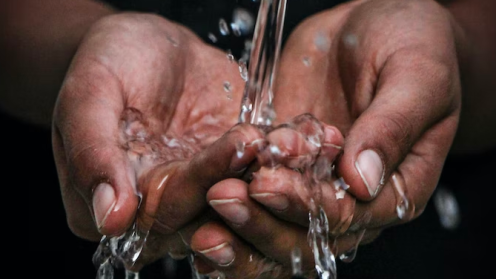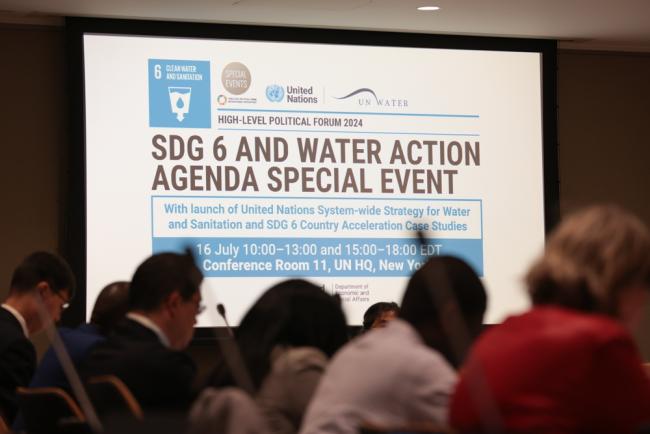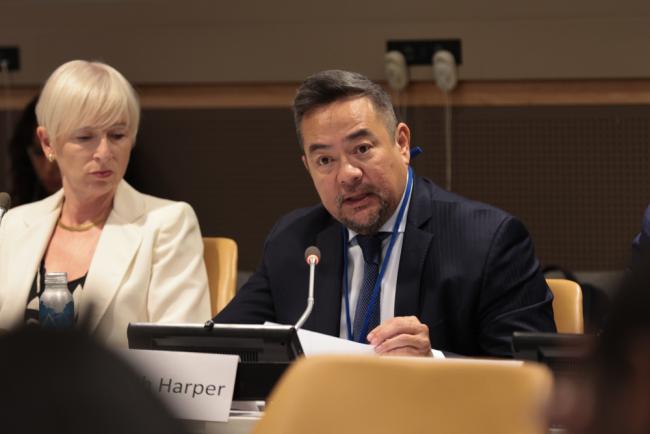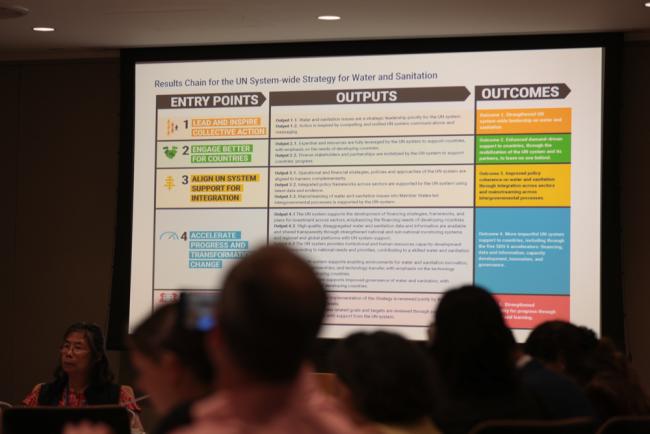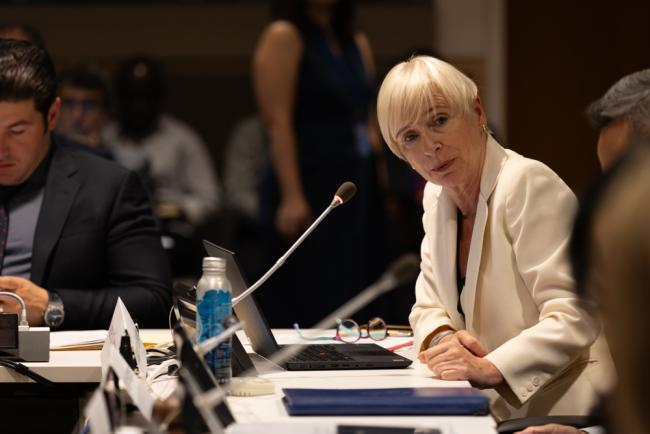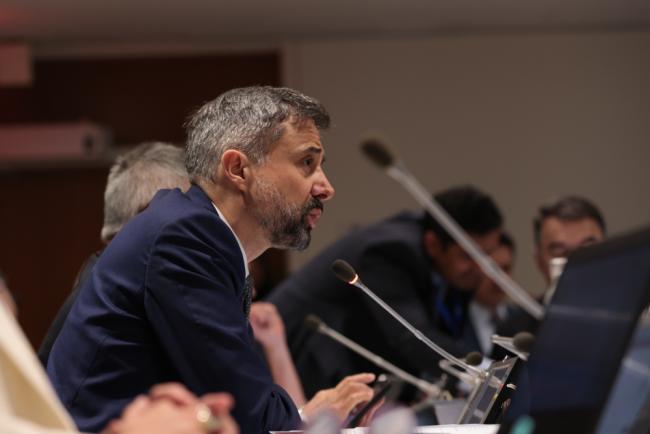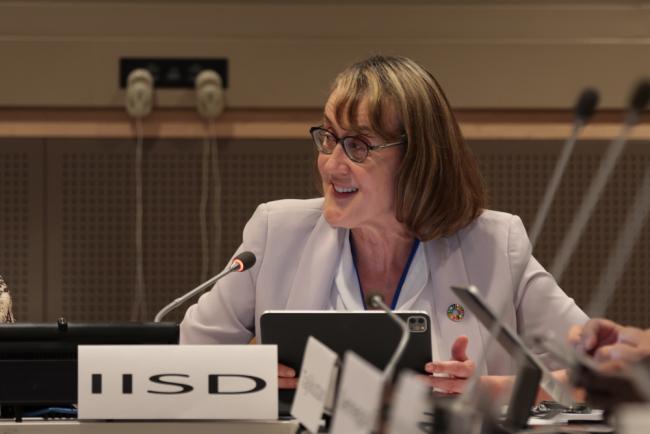About
The full-day event brought leaders from governments, Indigenous Peoples, non-governmental organizations, and the private sector together at UN Headquarters to discuss opportunities to move the water agenda forward.
Participants at the fourth annual SDG 6 and Water Action Agenda Special Event during the High-level Political Forum (HLPF) launched the first-ever UN System-wide Strategy for Water and Sanitation. Discussions also addressed follow-up to the UN 2023 Water Conference and preparations for the UN 2026 Water Conference as participants shared recommendations for achieving the necessary sixfold increase in progress in order to reach the water and sanitation goals for 2030. Among the challenges and opportunities discussed were the importance of stakeholder inclusion and good governance of water resources, the need for strong political will and public investment, and a willingness to adopt and adapt innovative approaches.
The Water Action Agenda, which comprises over 840 commitments from governments, civil society, and the private sector, was launched during the water conference in March 2023. Following this event, the UN General Assembly adopted a resolution calling for the development of a UN system-wide strategy for water and sanitation and for convening water conferences in 2026 and 2028. The full-day SDG 6 and Water Action Agenda Special Event took place on 16 July 2024, at UN Headquarters in New York, and brought together leaders from governments, Indigenous Peoples, non-governmental organizations, and the private sector to discuss opportunities to build on these and other recent meetings to move the water agenda forward.
Keynote Speaker
The keynote speaker, Keith Harper, Vice Chair of the UN Permanent Forum on Indigenous Issues (UNPFII), said including Indigenous perspectives means understanding that water is life, noting UNPFII recommendations guaranteeing Indigenous People’s Rights to clean water and cleaning up rivers and streams and banning pollution. He emphasized that the water crisis is a governance and cultural crisis. He called for the modalities resolution for the UN 2026 Water Conference to provide for the full participation of Indigenous Peoples, including in pre-conference consultations and agenda setting.
Launch of the UN System-wide Strategy for Water and Sanitation
Li Junhua, UN Under-Secretary-General for Economic and Social Affairs, announced the Strategy on behalf of the UN Secretary-General. He noted it had been developed through an interagency process in conversation with UN Member States, and that it seeks to support Members as they face water scarcity while also delivering an integrated approach to SDG 6 (clean water and sanitation).
Junhua highlighted the Strategy’s five entry points for collaborative action: strengthen collective leadership; enhance demand-driven support to countries; improve policy coherence; accelerate progress and transformative change through the five SDG 6 global accelerators (financing, data and information, capacity development, innovation and governance); and strengthen accountability for progress through joint review and learning.
Alvaro Lario, UN-Water Chair and President of the International Fund for Agricultural Development (IFAD), highlighted the collaboration of UN agencies and partners in preparing the Strategy and stressed the need for greater action and coordination. He said the strategy seeks to lead and inspire collective action, engage better for countries, align UN system support for integration, accelerate progress and transformational change, and account through joint review and learning.
Astrid Schomaker, Executive Secretary, Secretariat of the Convention on Biological Diversity, and UN-Water Member, outlined linkages between the Strategy and the Kunming-Montreal Global Biodiversity Framework, including targets to restore and protect water ecosystems and mainstream biodiversity in decisions across all sectors.
Patricia Fuller, President and CEO, International Institute for Sustainable Development, and UN-Water Partner, noted that, as the publisher of the Earth Negotiations Bulletin, IISD recognizes the opportunity for a more integrated approach to water across the multiple multilateral environmental agreements. Fuller also called attention to IISD’s Experimental Lakes Area – a globally unique freshwater research facility – and IISD’s partnership with the African Center for Aquatic Research and Education (ACARE), which brings scientists together from across the ten countries of the African Great Lakes region.
National Perspectives
Opening the session on national perspectives, representatives from the co-hosts of the UN 2026 Water Conference shared their plans for the event. Mohamed Cisse Diatta, Coordinator of the Follow‐Up Unit of the 9th World Water Forum, Ministry of Water and Sanitation, Senegal, said Senegal and the United Arab Emirates (UAE) share a vision on the importance of water, including the pressing water security challenges their regions face. He said the 2026 event should place water and sanitation at the heart of the global agenda and address ways to build community resilience to address water-related challenges. Abdulla Lootah, Deputy Minister of Cabinet Affairs for Competitiveness and Experience Exchange, Chair of the UAE National Committee on the SDGs, UAE, noted that the Climate Change Conferences have begun addressing water issues and pledged to place inclusivity at the heart of the 2026 meeting.
Representatives from the co-hosts of the UN 2023 Water Conference discussed the outcomes from that meeting. Meike van Ginneken, Special Envoy for Water, the Netherlands, called for strong tracking and accountability of the commitments in the Water Action Agenda and recommended keeping the agenda alive for the 2026 and 2028 Water Conferences. Daler Jum’a, Minister of Energy and Water Resources, Tajikistan, reported on the outcomes from the June 2024 meeting of the Dushanbe process, which reviewed progress catalyzed by 2023 conference.
Reports on additional water-related events included Indonesia’s summary of outcomes from the 10th World Water Forum. He reported the Bali event resulted in a ministerial declaration on water for shared prosperity as well as: a compendium of concrete actions/projects to be implemented regionally and globally; pledges to establish a center for water and climate resilience in Asia-Pacific; commitments to mainstream integrated water resource management, especially in Small Island Developing States (SIDS); and a proposal to have a World Lake Day, to be proposed by Indonesia to the UN General Assembly. Saudi Arabia reported on the inclusion of resilience and sustainable water management in the G20 action map during their presidency in 2020.
Margaret Froh, President of the Métis Nation of Ontario, stressed the need to include Indigenous Peoples in decision making on the management of water and the land. She also highlighted the need for alignment among international multilateral environmental agreements and the SDGs.
France recalled the commitment of Kazakhstan and France to host the One Water Summit in 2024 and said it would be an incubator of projects in preparation for the 2026 event.
During the discussion, government representatives welcomed the new UN System-wide Strategy on Water and Sanitation. Several highlighted the importance of communication and education about the strategy within UN member countries, with one speaker announcing her government’s pilot implementation project to do so.
Many governments emphasized the importance of policy coherence and mainstreaming and supported the strategy’s focus on integrating water and sanitation issues into other processes.
Several Member States expressed their hope that a UN Envoy on Water would be appointed soon. One speaker noted that the final sticking point in the negotiations for the UN General Assembly modalities resolution for the UN 2026 Water Conference is whether there will be a negotiated final document.
Civil society representatives called for enhancing transboundary water cooperation, including through building capacity to negotiate new agreements. They also called for including all stakeholders, including youth.
Launch of the 2024 SDG 6 Country Acceleration Case Studies
This session launched SDG 6 Country Acceleration Case Studies from Cambodia, Czechia, and Jordan, followed by a panel discussion on lessons for achieving progress on SDG 6 at the country level. Key drivers of progress were highlighted as strong political will, public investment, a willingness to adopt and adapt innovative approaches, attention to context, and stakeholder inclusion. Speakers also stressed the importance of global frameworks, regional cooperation, and national planning.
Mary Matthews, UNDP Water Lead and UN-Water Senior Programme Manager, presented the case studies and called attention to UN-Water’s task force on country-level engagement. She reported Cambodia has made impressive progress on SDG 6 through the provision of basic services and access to safely managed sanitation, including a doubling of access to sanitation in rural areas in recent years. While Czechia has achieved 98% access to safe drinking water and 89% access to safe sanitation, Matthews said the last mile efforts have been a challenge. She noted this country has set higher tariffs at “socially-responsible” levels to incentivize efforts to reduce leaks and other consumption-reduction actions. In Jordan, Matthews noted progress in access to safe drinking water is coming through non-pipe solutions, such as tankers. She said the country is showing progress despite the fact that a large influx of refugees has put a strain on the country, and noted that key drivers of this progress include government commitment, coping mechanisms for intermittent water supply, investment in wastewater reuse, efficiency in the agriculture sector, and technical cooperation within the country and with its neighbors.
A panel discussion among representatives from the three countries and the UN Economic Commissions followed. Speakers called attention to the importance of: regional cooperation and support for transboundary and multi-stakeholder approaches; joint adaptation planning; finance, including national budgeting and cooperation with development banks and the private sector; data and information management, from smart water meters to national water information systems; and strategic planning and policy frameworks with clear policies and key performance indicators.
Additional processes and events were highlighted, including the International Year of Glaciers' Preservation, 2025, the UN Economic Commission for Europe’s Protocol on Water and Health and the Water Convention.
During the discussion, participants highlighted: the need to maintain the momentum and involvement of youth in the water agenda; the importance of strong monitoring and evaluation for projects; the value of capturing and sharing best practices; and the challenge of engaging the public in addressing the water and sanitation agenda. The need to address new pollutants such as microplastics and pesticides was also noted.
Water Action Agenda
The moderator for this session, Kaveh Madani, Director UNU Institute for Water, Environment and Health, noted over 840 commitments have been announced to date and encouraged participants to discuss challenges and lessons learned in implementing their Water Action Agenda commitments.
Among the recommendations highlighted by participants were: the importance of collaborations and partnerships; embracing water as an opportunity to engage the private sector with the UN; and the need to relate challenges and opportunities to what will happen in a politician’s district as well as to develop information about water in terms that are understandable to the public sector. Speakers also called for adopting transparent governance practices with clear commitments and results, and suggested that water should be “anchored” in all upcoming meetings and used as stepping stones toward the UN 2026 Water Conference.
Most speakers stressed the importance of inclusion as a means for transformation, including by respecting the rights of Indigenous Peoples and ensuring they set the agenda. The need to use a gender lens was also highlighted. Youth representatives called for recognizing the plurality of voices and reversing historical injustices through equitable finance, accountable mechanisms, and inclusive innovation.
Links to more information:
Agenda and concept note
Morning session on UN WebTV
Afternoon session on UN WebTV
To receive free coverage of global environmental events delivered to your inbox, subscribe to the ENB Update newsletter.
All ENB photos are free to use with attribution. For HLPF 2024, please use: Photo by IISD/ENB | Kiara Worth.
